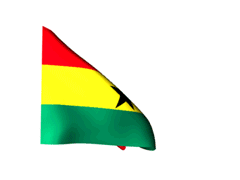
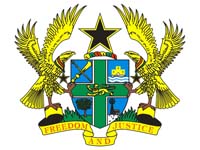


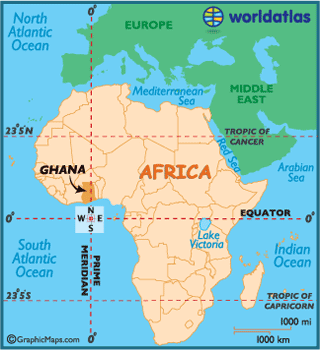
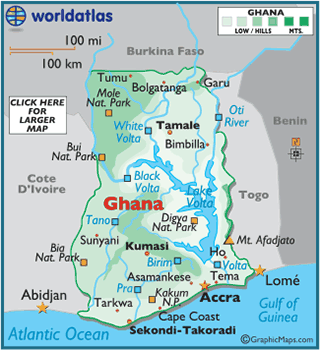
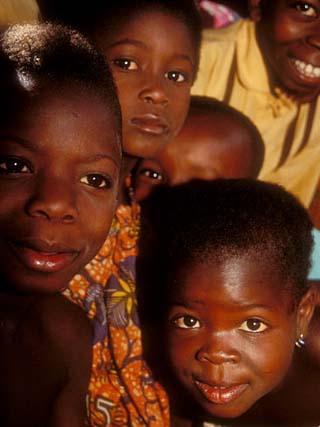
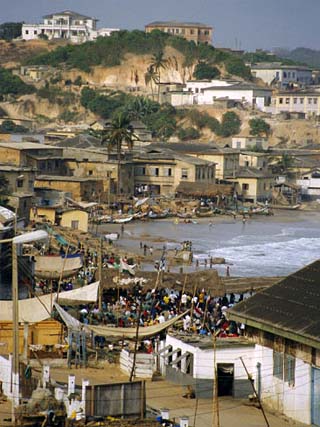
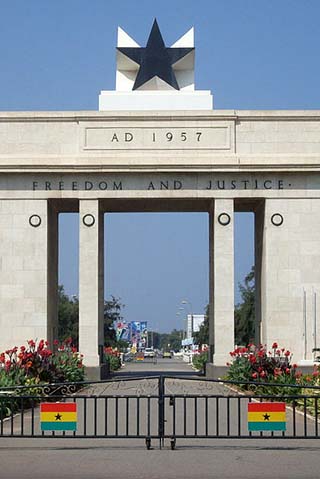
Tel Code..: +233
Ethopian Airlines - Lufthansa - Emirates- British Airways - Egypt Air- KLM- Air Maroc - THY
Viza..: Needs
Courses or boosters usually advised: Hepatitis A; Poliomyelitis; Tetanus; Typhoid; Yellow Fever.
Other vaccines to consider: Cholera; Diphtheria; Hepatitis B; Meningococcal Meningitis; Rabies.
Yellow fever vaccination certificate required for travellers over 1 year of age arriving from countries with risk of yellow fever transmission.
Name: Ghana
President: John Dramani Mahama (2012)
Land area: 88,811 sq mi (230,020 sq km); total area: 92,456 sq mi (239,460 sq km)
Population (2014 est.): 25,758,108 (growth rate: 2.19%); birth rate: 31.4/1000; infant mortality rate: 38.52/1000; life expectancy: 65.75
Capital and largest city (2011 est.): Accra, 2.573 million
Other large cities: Kumasi, 2.019 million (2011)
Monetary unit: Cedi
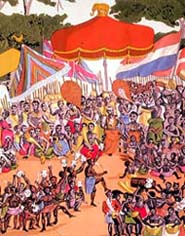
The word
Ghana means "Warrior King" and it derives from the ancient Ghana Empire. This
land was in fact inhabited in pre-colonial times by a number of ancient Akan
Kingdoms.
Trade with Europeansstates
flourished after contact was made withPortugal during
the 15th century.
The region would eventually become aBritish Crown
colony called Gold Coast, and more than 30 forts and castles were constructed.
For centuries the Gold Coast was known as 'The White Man's Grave' due to the
amount of Europeans who
perished from malaria and other tropical diseases.
The merger of Gold Coast and the Togoland trust territory, officially formed
Ghana in 1957, and it became the first sub-Saharan country in colonial Africa to
gain its independence.
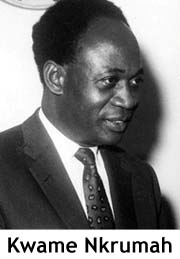
The first prime minster of Ghana, Kwame Nkrumah, was known as the president of
the modern Ghanaian state, and an anti-colonial leader. He became the first head
of state to offer the idea of Pan-Africanism, a movement aimed to "unify and
uplift"African peoples,
which he grew familiar with during his studies abroad at Lincoln University in
the state of Pennsylvania, U.S..
A long series of coups led to the suspension of the constitution in 1981 and a
ban on political parties.
Many natives fled Ghana in the aftermath of the ban, migrating to other
countries, and the economy significantly declined as a result.
After a ten-year hiatus, political parties became legal again and many parties
were formed. The major parties are the National Democratic Congress, the New
Patriotic party and the Convention People's Party.

Ghana has many natural resources, giving it a much higher per capita output than
the poorer countries in West Africa.
However, it is still dependent on trade and international assistance.
During colonial times, Ghana was best known for its gold and today is still a
top producer of the world's gold. The country also exports diamonds, cocoa,
timber, electricity, bauxite and manganese.
In 2007, an oil field was discovered offshore and oil exploration continues
along with the production of oil.
In December 2012, John Dramani Mahama won the presidential election, and
defeated Nana Akufo-Addo, despite a ruling of thousands of misreported votes.
Political corruption continues to rise within the country
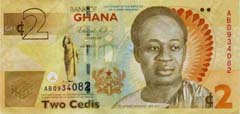
Coastline: 334 miles (539 km)
Dissected by the largest artificial lake on the planet (Lake Volta), nearly 50%
of Ghana lies less than 499 ft (152 meters) above sea level.
The country's highest point, Mount Afadjato, rises 2,887 ft (880 m); it's lowest
point is the Gulf of Guinea at 0 m.
Ghana's coastline is low and sandy, backed by plains and scrub and intersected
by several rivers and streams, most of which are navigable only by canoe.
A tropical rain forest belt (central and east) broken by heavily forested hills
and many streams and rivers, extends northward from the coastline. To the north
of this region the country varies from 299 to 1,299 ft (91 to 396 m) above sea
level and is covered by low bush, park-like savanna, and scattered grassy plains.
Formed by the Akosombo Dam, and completed in 1965, Lake Volta is the largest
reservoir by surface area in the world, and the fourth largest one by water
volume. It is located completely within Ghana, and it has a surface area of
about 3,275 square miles (8,502 square km).
In the north the Oti and the Black Volta and White Volta rivers drain into Lake
Volta, which then flows south towards the sea.
Climate:
Ghana's climate is generally tropical. The eastern coastal belt is warm and
comparatively dry, while the southwest corner is hot and humid, and the north,
hot and dry.
There are two distinct rainy seasons in the south: May through June and August
though September. In the northern regions, the rainy seasons tend to merge.
A dry northeasterly wind, the Harmattan, blows in January and February. Annual
rainfall in the coastal zone averages 33 inches (83 cm) http://www.infoplease.com/encyclopedia/world/liberia-economy.html
Ghana's economy is predominantly agricultural, with 60% of the population engaged in subsistence agriculture. The biggest cash crop is cocoa. Rice, coffee, cassava, peanuts, corn, shea nuts, and bananas are also widely grown. Fishing and lumbering are important, although inadequate roads and facilities have hindered the development of the timber industry.
Minerals (most importantly gold, but also industrial diamonds, bauxite, and manganese) are found in the north, south, and coastal regions. There are offshore petroleum deposits, and commercial exploitation began in 2010.
The major industries in Ghana are mining, lumbering, light manufacturing, aluminum smelting, cocoa and other food processing, and shipbuilding. The major exports are gold and other minerals, cocoa, timber, and tuna. Imports include capital equipment, petroleum, and foodstuffs. The Netherlands, Nigeria, Great Britain, the United States, and China are Ghana's major trade partners. The country has a large but poorly maintained road system; rail lines connect the major centers in the south.
Ghana is governed under the constitution of 1992. The executive branch is headed by a president, who serves as both head of state and head of government. The unicameral legislature consists of a 275-seat Parliament. Both the president and the legislature are popularly elected for four-year terms; the president's tenure is limited to two terms. Administratively, the country is divided into ten regions.
Modern Ghana comprises the former British colony of the Gold Coast and the former mandated territory of British Togoland. It is bordered by the Côte d'Ivoire on the west, Burkina Faso on the north, and Togo on the east. The coastal region and the far north of Ghana are savanna areas; in between is a forest zone. The country's largest river is the Volta; the damming of the river for a hydroelectric station at Akosombo (1964) created the enormous Lake Volta. In addition to the capital (Accra), other important cities are Kumasi, Tema, Sekondi-Takoradi, Cape Coast, and Tamale.
Ghana's population is composed of many ethnolinguistic groups, the principal of which are the Akan (Ashanti and Fanti), Mole-Dagbani, Ewe, and Ga-Adangme. English is the official language. Some 69% of the population is Christian (Pentecostal and other Protestant churches, and Roman Catholic) and 16% is Muslim (living mainly in the north), with the remainder following traditional religions.